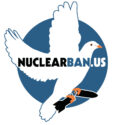The urgency of the situation we face today, and the need to take immediate steps to reduce the threat of a nuclear war, have led a number of organizations to join together to issue this ‘Call’:
Back from the Brink: A Call to Prevent Nuclear War
We call on the United States to lead a global effort to prevent nuclear war by:
- renouncing the option of using nuclear weapons first
- ending the president’s sole, unchecked authority to launch a nuclear attack
- taking US nuclear weapons off hair-trigger alert
- cancelling the plan to replace its entire arsenal with enhanced weapons;
- actively pursuing a verifiable agreement among nuclear armed states to eliminate their nuclear arsenals
To add your name to this Call and receive information on how to get your friends and neighbors, colleagues, organizations, towns and cities to do likewise, go to www.preventnuclearwar.org.
Background Information
Since the height of the Cold War the US and Russia have dismantled more than 50,000 nuclear warheads, but 15,000 of these weapons still exist and they pose an intolerable risk to human survival. 95% of these weapons are in the hands of the United State and Russia; the rest are held by seven other countries, the United Kingdom, France China, Israel, India, Pakistan and North Korea. https://fas.org/issues/nuclear-weapons/status-world-nuclear-forces/
The use of even a tiny fraction of these weapons would cause worldwide climate disruption and global famine. As few as 100 Hiroshima sized bombs, small by modern standards, would put at least 5 million tons of soot into the upper atmosphere and cause climate disruption across the planet, cutting food production and putting 2 billion people at risk of starvation. http://www.psr.org/assets/pdfs/two-billion-at-risk.pdf
A large scale nuclear war would kill hundreds of millions of people directly and cause unimaginable environmental damage. http://www.psr.org/assets/pdfs/projected-us-casualties-and-destruction.pdf It would also cause catastrophic climate disruption dropping temperatures across the planet to levels not seen since the last ice age. Under these conditions the vast majority of the human race would starve and it is possible we would become extinct as a species. http://climate.envsci.rutgers.edu/pdf/RobockNW2006JD008235.pdf
Despite assurances that these arsenals exist solely to guarantee they are never used, there have been many occasions when nuclear armed states have prepared to use these weapons, and war has been averted at the last minute. http://www.ucsusa.org/sites/default/files/attach/2015/04/Close%20Calls%20with%20Nuclear%20Weapons.pdf) Nuclear weapons do not possess some magical quality that prevents their being used. As former Defense Secretary Robert McNamara said, speaking about the Cuban Missile Crisis, “In the end, we lucked out — it was luck that prevented nuclear war.” Our current nuclear policy is essentially the hope that our good luck lasts.
Furthermore, the danger of nuclear war is growing as climate change puts increased stress on communities around the world increasing the likelihood of conflict. https://www.scientificamerican.com/article/once-again-climate-change-cited-as-trigger-for-war/
The planned expenditure of more than $1 trillion to enhance our nuclear arsenal will exacerbate these dangers by fueling a global arms race and it will divert crucial resources needed to assure the well-being of the American people. https://www.armscontrol.org/factsheets/USNuclearModernization
There is an alternative to this march to nuclear war. In July of 2017, 122 nations called for the elimination of all nuclear weapons by adopting the Treaty on the Prohibition of Nuclear Weapons. http://www.icanw.org/treaty-on-the-prohibition-of-nuclear-weapons/ The United States should embrace this treaty as the centerpiece of our national security policy.
